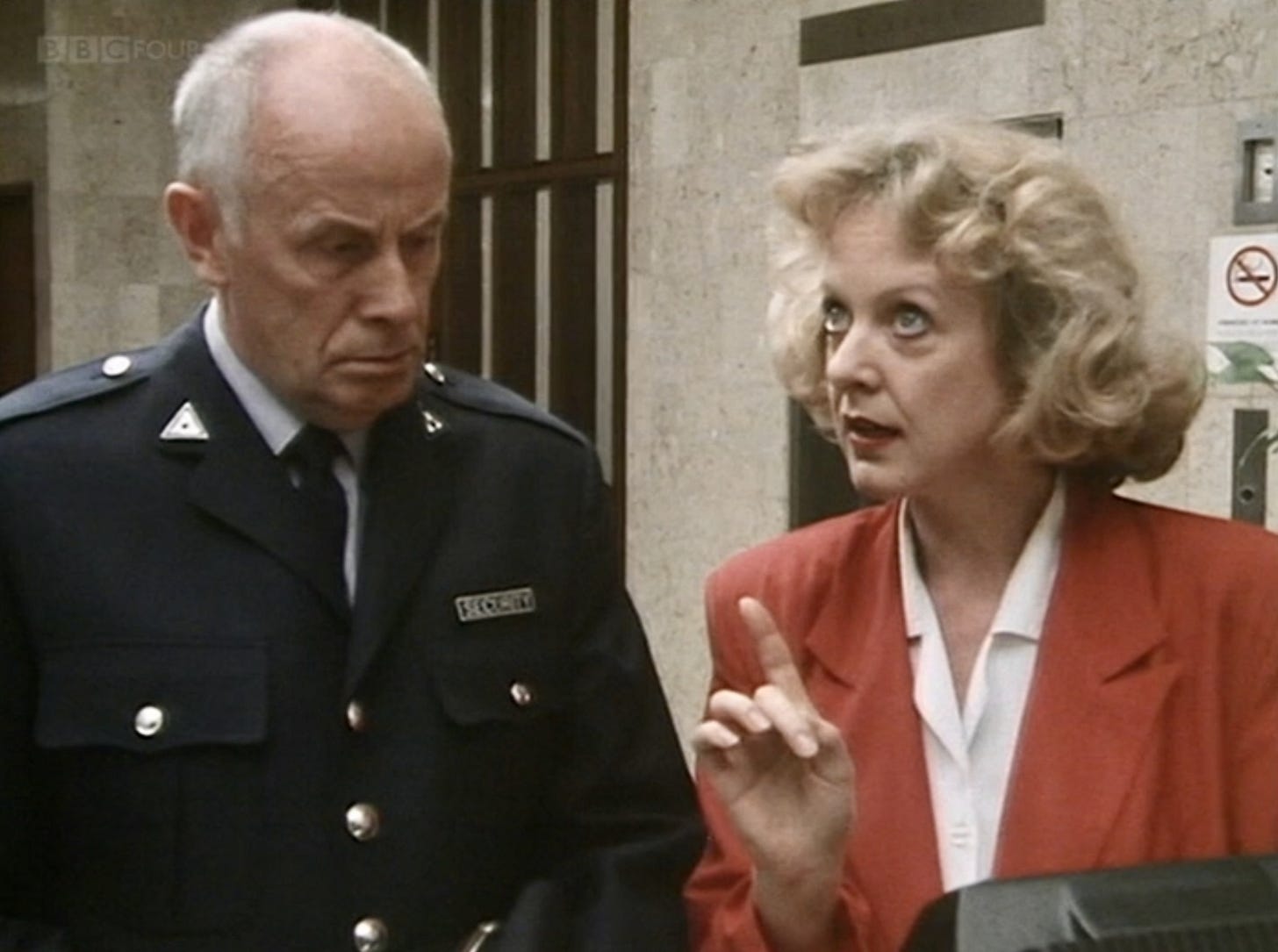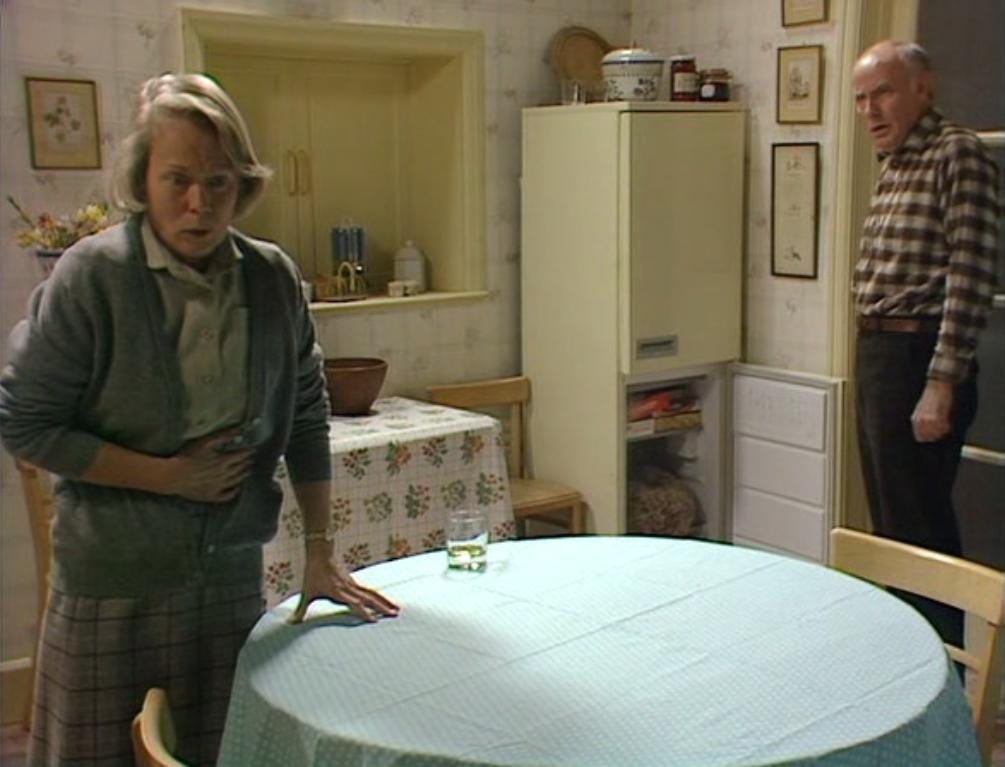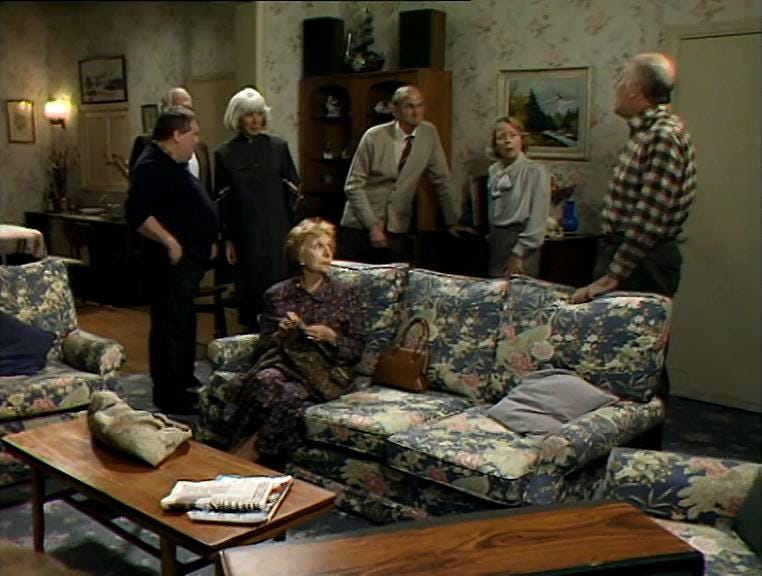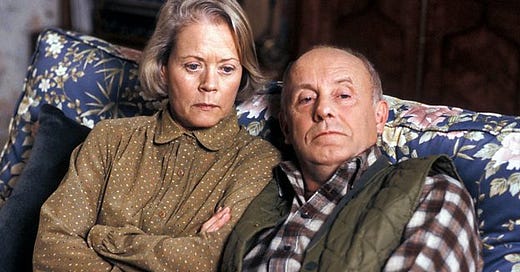At its peak, tens of millions of viewers sat down to watch the BBC TV comedy One Foot In The Grave, written by David Renwick, and enjoy the often hilarious difficulties of the main character Victor Meldrew, played by Richard Wilson. Six series of six half-hour episodes and seven Christmas specials aired from 1990-2000. The show won numerous awards and made a lasting cultural impact. Many regard it as one of the greatest British comedy sitcoms ever. In Britain, the phrase, “I don’t believe it,” often yelled by an exasperated Victor, evokes his name. When a person derides another as a “Victor Meldrew”, they criticise someone for their grumpy attitude. Victor does not always handle situations perfectly, but too much focus on the amusing mishaps that befall him obscure his upstanding and positive traits. The comedy offers some interesting comparisons between the Britain of the 1990s and 2023. The show is set in an unnamed town in southern England. It was filmed in Dorset.
In the first scene of the first episode, Alive And Buried, Victor is relieved of his job as a security guard. One woman asks another, “Twenty-six years sitting behind a reception desk. What must that do to a man’s brain?’’ A sad Victor sees the box that has taken his livelihood. “It does everything you used to do, except complain about the air conditioning. Visitors will have a security clearance code. When they come in, they just feed the number in here.” The opening minutes of this sitcom reveal a process of technological advancement in the workplace. The attendant social and moral questions are greater now than in 1990. In 2023, talk of artificial intelligence threatening jobs is commonplace.

Victor struggles to deal with early retirement taken at the age of 60. He does not jump at this event as the two employees who conversed on his fate thought he should. On the contrary, he feels dispensed with and struggles to fill his days.
Towards the end of the episode, Victor's car breaks down and slows to a crawl along the curb before he asks a police officer working undercover as a prostitute for some assistance. Later, Victor reads a news report about the incident to his wife Margaret:
'''I first observed the accused driving round the area slowly with a shifty look on his face. He pulled up and called out:
'Excuse me, miss, but can you spare me some time?’
''When I asked what he meant, he replied,
'I may need a hand pumping this thing up.’
''A problem, I gather, commonly associated with elderly men.''
'A search of Meldrew's car revealed a collection of chains, padlocks and handcuffs. When quizzed about these by the prosecution, he claimed to have been out that night rehearsing an escapology act, to much laughter and merriment from the jury. Though cleared of all the charges before him, Meldrew was fined £500 for contempt of court after taking the Bible in his right hand and hurling it at the presiding magistrate.’
Had those responsible for servicing his car done their job, Victor would have evaded this misfortune and the embarrassing news report made worse by the items found in his car. Such bad luck is a recurrent theme throughout the sitcom.
The next instalment of the series, The Big Sleep, sees Victor met with another allegation of sexual misconduct. A window cleaner sees him drying his genitals with a flannel, presumably after he failed to draw his curtains. She complains to Margaret about this and cannot accept that her unsolicited view of Victor’s penis followed no ill intent from him. She threatens to report the matter to the police and tells Victor with some vehemence that people like him should be “destroyed”. He reacts indignantly to the accusation, panic he does not. Victor remains relatively calm in the face of another crisis, knowing he is innocent; he does not betray fear of what may follow. Such firmness in an adverse situation is commendable. One can easily imagine a weaker character mincing about in distress.
Later on, when doing some work outside, Victor deplores the litter in his garden that he picks up off the grass. Then he turfs Jehovah’s Witnesses out of his home after initially thinking they were police officers wanting to question him on an allegation of indecent exposure. Before realising this, Victor is visibly worried but does not tremble. He does not allow people to violate him in his own home, and he is certainly not the only one to be provoked by unsolicited guests.
In The Valley of Fear, Victor’s inclination to do the right thing by himself and others comes to the fore. The show begins with Margaret on the phone, informing her mother of an attack on Victor. She tells her that Victor has had several items taken, including his watch, wallet, and brown tweed jacket. Victor stands with blood visible through a bandage on his head. He reports the matter to the police and tells Margaret that criminals receive more care in society than their victims. Many in Britain today will agree with this viewpoint. It is perhaps more common nowadays to hear people lament the absence of suitable measures to deter crime and the soft sentences handed to those convicted than in the 1990s. Margaret responds to Victor by reminding him that he voted for the SDP (Social Democratic Party). The implication is that there were better electoral choices available to confront crime. The British SDP of 1990, the group's second incarnation, had a centre or centre-left orientation and was dissolved that year following a poor by-election result in Bootle. The party favoured a mixed economy, decentralisation, the rejection of the overinfluence of trade unions, European integration, and general social liberalism. The current offshoot of this party has a socially conservative and eurosceptic stance. It rejects the cultural leftism that was not as prevalent and overt in 1990 as it is now. In this reference to politics in the sitcom, Victor reads the Daily Mirror. The viewer may tell from his vote and newspaper that he is of a left-of-centre persuasion.
It is important to remember that this episode is set well before the coming to power of Tony Blair’s Labour Party in 1997 and the paradigm shift that flung Britain much further to the left on cultural matters. In 1990, there was less pressure against a positive British identity and national character. In the Britain of 1990, it would be unfair to make sweeping generalisations about someone based on their choice of a left-leaning newspaper; it would be unfairer than it would be today. Culturally and demographically, Britain was more intact then. If generalisations can be fair, then in 2023, a choice of a left-leaning publication may lead us to infer that someone is content with the dissolution of the country through drastic demographic change, that they are indifferent or amenable to "affirmative action", and that they accept the constant denigration of our history through endless ahistorical critiques. In 1990, to infer such views would be undue. These issues were not as salient as they are now. General political disagreements of one kind or other were less likely to indicate an adversarial opposition regarding the fundamental basis of life and society. The 1990s were less tumultuous than the 2020s in so many ways.
Later in The Valley of Fear, Victor and Margaret tragically discover a stray cat has made it into their kitchen freezer and died. Margaret is overcome with distress and dread. It falls on Victor to meet the problem head-on. He takes ownership of the situation and removes the frozen cat from the freezer while Margaret, who can barely look, fails to steady herself. He does not hesitate or shy away from the task at hand. Undoubtedly, it is incumbent on Victor as the man to assuage the upset of his wife. He demonstrates positive masculinity.

When it comes to confronting crime Victor is no bystander. In the same episode, he hosts a meeting of the local neighbourhood watch. He tells those present that the litter-throwing and verbal abuse by young people in the area is a serious concern. In 2023, the ills of Victor’s locality seem trifling and would be highly unlikely to make it into the script of a British programme today on account of the levels and character of crime now. The Britain of 1990 is a lost country in so many ways.
Keen to get on with things at the meeting, Victor grows frustrated at the attendees who distract themselves with a smell at a sideboard in the living room. The cause of the smell is unknown. He lets out a contemptuous cry in annoyance at those present, showing his aversion to extraneous chatter. Anyone who has had to deal with the needless prattle of others when looking to accomplish something meaningful can relate to Victor’s angst in this situation.

Victor shows a starting pistol to the gathering. One man mocks him before Victor retorts that the object will serve as a deterrent to miscreants. Victor eventually loses patience and gives up on the meeting when the group decide to watch Emmerdale on TV. The debate over the right to bear arms or imitation weapons can be intense. Strong views exist on either side of the divide. Many may sympathise with Victor’s decision to carry a starting pistol, particularly in the current climate where the failure of the Metropolitan Police to attend to victims of burglary is widely reported.
In a later scene, Victor attends a market and tries on jackets. He is irritated when a salesman attempts to flatter him by saying that he looks good in every item he wears. Losing his temper with the salesman who will tell him anything to ensure that he spends money, Victor tells him, “I also thought I might stick this paper bag over my head. What do you reckon?” Such contempt for those who tell people anything to exploit them financially is justified.
Victor tells the salesman he is looking for a tweed jacket, and his attention moves to one on sale. His eyes widen, and he asks him where he got it. Before the salesman can answer in full, Victor seizes the jacket and departs after saying: “Take your hands off me if you value your life!” The salesman moves to retrieve the product but halts when he sees a pistol in Victor’s bag. When Victor returns home, Margaret tells him that the police have returned his jacket after finding it during a raid. An aghast Victor suddenly realises he has committed an armed robbery in broad daylight. He probably should have called the police when he thought the salesman had his jacket. Such is human fallibility. Many of us sometimes do things in haste.
The character Victor Meldrew is of far more merit than many others to feature in British sitcoms. In the Royle Family, a programme with its upsides, the main character Jim Royle sits on his fat arse for the entirety of nearly every episode. He relies on his wife to do everything while he festers opposite the TV. Victor stands as a positive antithesis to this lifestyle.
There are many differences between the Britain of 1990 and 2023. There are some similarities also. Technology still threatens jobs. People still struggle to come to terms with retirement. People still express upset at levels of crime. Many believe responses to it lack severity. Some communities still work together to address it. Notwithstanding the desire of some today to reject the different qualities of men and woman, most of us still value masculinity, including that of the kind displayed by Victor in attending to the dead cat. These factors make him a highly relatable character.
Throughout the first three episodes of One Foot In The Grave, we find that Victor is a man who wants to be of use. His sense of self-worth and purpose comes under threat following the loss of his job. He is averse to idleness. Bad luck finds him, and mishaps occur, but he carries on. When a failure to draw his curtains leads to an accusation, Victor does not crumble. He is proud of his garden; those with neighbours who fail to maintain their properties will appreciate this. Victor rejects people encroaching on his home and reacts with justifiable anger to Jehovah's Witnesses when they violate his sense of fairness by coming to him unannounced. With his wife in distress, he moves to assuage her discontent. After becoming a victim of crime, Victor attempts to rally his community to make his locality safer. He shows initiative to confront an absence of morality; he has to contend with people easily distracted by less important things. Recklessly, he did retrieve what he thought was his stolen jacket, but this act followed the injustice of robbery that he suffered. If you hear the name “Victor Meldrew” used to describe someone who repeatedly moans and complains, you will do well to remind them of Victor’s merits.
Reference: One Foot in the Grave Episodes' Transcripts | Subs like Script
Over the coming weeks and months, the conclusion of the series on the British regalia will feature, so will a piece on Oswald Spengler’s analysis of music and painting, an article on the origin and meaning of an English phrase, and a look at a popular sandwich in Britain. A resumption of the series on William Franklin’s loyalism is also in the pipeline. So are more pieces on Victor Meldrew and One Foot In The Grave.





I remember my mother calling me a 'Victor Meldrew' from time to time. Having been born in 1992, I never really knew what that meant beyond saying "I don't believe it!" a lot (which I never did) and a generalised grumpiness (which is certainly true - even as a small child I was quite happy to be an old man). I never watched the show, but it certainly sounds like I've been missing out. Is it on the iplayer or does one have to rely on youtube/DVDs?